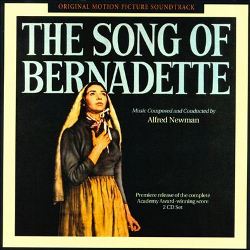THE SONG OF BERNADETTE – Alfred Newman
 100 GREATEST SCORES OF ALL TIME
100 GREATEST SCORES OF ALL TIME
Original Review by Craig Lysy
Producer William Perlberg of 20th Century Fox saw opportunity for the studio after reading the novel “The Song Of Bernadette” (1942) by Franz Werfel, and so resolved to bring this inspired and miraculous story to the big screen. Henry King was hired to direct and veteran screenwriter George Seaton tasked with writing the screenplay. For the actors, a nationwide talent search found 24 year old Jennifer Jones, who was selected to play the title character of Bernadette Soubirous. Supporting actors included Vincent Price in perhaps his finest performance as (Prosecutor Vital Dutour), Aubrey Mather (Mayor Lacade), Charles Dingle (Chief of Police Jocomet), Charles Bickford (Dean of Lourdes) and Gladys Cooper (Sister Therese Vauzous). The film was made in 1943, as the world suffered under the dark pall of Nazism. Its narrative offers an intimate venerative, and sympathetic accounting of a young peasant girl, who one day beholds, a miraculous vision of a refulgent “Beautiful Lady”. We bear witness to her stirring and remarkable journey of faith and courage, as well as a commentary against the banality of government, the skepticism of science and the dogmatism of organized religion. Bernadette’s sincerity, innocence, and purity of heart eventually overcome all critics, skeptics, and obstacles. A shrine is eventually built to commemorate the miracle of her vision of Mary, and she spends her final days secluded in a nunnery, suffering from a very painful form of tuberculosis of the bone, from which she succumbed at the young age of 35. The film was both a commercial and critical success, earning an astounding twelve Academy Award nominations, winning four for, Best Actress, Best Cinematography, Best Art Direction, and best Musical Score.
Thematically Newman created seven themes, which included two themes for the title character; Bernadette’s Theme 1 offers one of Newman’s greatest themes, which echoes through time. It is a supremely lyrical, warm, major modal identity born by violins brillante. The repeating four-note phrasing of its A Phrase, and the descending violin statements with horn counters of its B Phrase is sublime. Bernadette’s Theme 2 is also violin carried with woodwind adornment, and built upon repeating five-note phrasing. It however bears none of the splendor of inspiration of Theme 1, instead abounding in happiness and sweet contentment. The Authority Theme has a dichotomous application in that it emotes both the power of the State, and the power of the Church, each of which stand resolutely against Bernadette. It is expressed as four note declaration by horn chorale, which bears power, majesty and at times dark purpose. Next, for the Lady Theme, Newman fully captures her divinity, bathing us in a refulgent religioso splendor born by violins brillante and ethereal chorus. His inspiring and stirring music finds a sublime synergy with the radiant imagery of the Lady.
With the Grotto Theme Newman chose not to take the obvious route and speak directly to a divine revelation; rather, he chose instead to express a wondrous experience by a young girl who lacked the intellect and sophistication to fathom her circumstances other than a vision of beauty. As such he used the orchestra to emote the pastoral sounds of nature. He created an impressionistic milieu consisting of fluttering flutes for the breeze, an oboe for bird song, strings for rustling leaves, and wordless human voice to inform us of Mary’s presence. This nuanced and insightful approach was sheer genius. The Misery Theme is born by pensive woodwinds, strings doloroso and bathes us is dark orchestral colors. It speaks to us of the sad and impoverished life of Bernadette and her poor family, which each day struggle to find food and survive. Lastly, we have the Children’s Theme, a wondrous identity born by bouncing woodwinds and spritely strings, which abounds with happiness, and carries us with youthful abandon.
this score stands as one of the finest in Newman’s immense canon. He created seven exceptional themes, including the genius of the Grotto Theme. His music fully captured the religioso splendor and inspiration of this heartfelt tale, as well as Bernadette’s purity and innocence. Rarely in film score art have composers been able to achieve the sublime moments of beauty created by Newman with this effort, moments that for me often elicited a quiver and a tear. This score is a testimony to Newman’s greatest, one of the finest ever written by the hand of man, and a shining example of the glories of the Golden Age. I highly recommend this score as essential to your collection.
For those of you unfamiliar with the score, I have embedded a Youtube link to a wonderful 14 minute suite: https://www.youtube.com/watch?v=pC9sHhKnzMQ
A comprehensive review of the score may be reached by the following link: https://moviemusicuk.us/2015/06/15/the-song-of-bernadette-alfred-newman
Buy the Song of Bernadette soundtrack from the Movie Music UK Store
Track Listing:
- Overture (6:52)
- Prelude and Early Dawn (7:21)
- The Day Begins (3:37)
- The Vision (4:18)
- I Saw a Lady (2:44)
- The Betrayal (0:57)
- Good Fortunes (2:30)
- A Mother’s Love (6:41)
- The Grotto (2:40)
- From Her Very Depths (2:44)
- The Officials (7:54)
- A Father’s Promise (1:53)
- The Reverend (2:48)
- The Directives (4:43)
- The Spring (1:38)
- The Miracle (1:06)
- Rumours of Healing (2:55)
- Immaculate Conception (2:03)
- You’re Playing With Fire (1:39)
- Load Well Your Gums (2:24)
- Commission Convenes (1:52)
- Destiny (6:27)
- The Farewell (5:33)
- The Spring Is Not For Me (2:28)
- Your Life Begins (5:15)
- Exit Music (1:52)
- Commission Convenes (Alternate) (2:32)
- Unused Cue #1 (2:32)
- Unused Cue #2 (4:14)
- Unused Cue #3 (1:17)
Running Time: 103 minutes 29 seconds
Varese Sarabande VSD-6025 (1943/1999)
Music composed and conducted by Alfred Newman. Orchestrations by Edward Powell. Score produced by Alfred Newman. Album produced by Nick Redman and Rick Victor.

